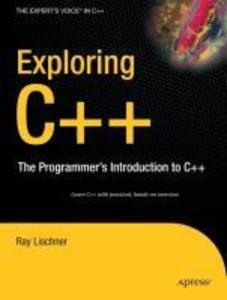C++ is one of the most used object-oriented languages and is used when speed and reliability are required. It is used for many system-level tasks, such as operating-system programming. For example, Windows and Linux include chunks of C++ programming. Windows applications continue to be written in C++.
This is a book about learning by doing and is aimed at programmers familiar with programming, but not C++. The key exercises are not simply listed at the end of the chapter, but are integrated into the main text. Readers work hands-on throughout the book. Each lessons poses numerous questions, asking readers to write answers directly in the book. The book includes answers to all questions, so readers can check their work. These exercises are not simple cookbook-style recipes (e. g. , "Write a program to do xyz"). Instead, they are explorations-structured labs that guide readers through a series of steps to highlight specific features of C++.
Inhaltsverzeichnis
The Basics. - Honing Your Tools. - Reading C++ Code. - Integer Expressions. - Strings. - Simple Input. - Error Messages. - For Loops. - Formatted Output. - Arrays and Vectors. - Increment and Decrement. - Conditions and Logic. - Compound Statements. - to File I/O. - The Map Data Structure. - Type Synonyms. - Characters. - Character Categories. - Case-Folding. - Writing Functions. - Function Arguments. - Using Algorithms. - Overloading Function Names. - Big and Little Numbers. - Very Big and Very Little Numbers. - Documentation. - Project 1 : Body-Mass Index. - Custom Types. - Custom Types. - Overloading Operators. - Custom I/O Operators. - Assignment and Initialization. - Writing Classes. - More About Member Functions. - Access Levels. - to Object-Oriented Programming. - Inheritance. - Virtual Functions. - Classes and types. - Declarations and Definitions. - Using Multiple Source Files. - Function objects. - Useful algorithms. - Iterators. - Exceptions. - More operators. - Project 2: Fixed-point numbers. - Generic Programing. - Function templates. - Class templates. - Template Specialization. - Partial Specialization. - Names and Namespaces. - Containers. - International Characters. - Locales and Facets. - Text I/O. - Project 3: Currency type. - Real Programing. - Pointers. - Dynamic Memory. - Exception-Safety. - Old-Fashioned arrays. - Smart Pointers. - Working with Bits. - Enumerations. - Multiple inheritance. - Traits and Policies. - Names and Templates. - Overloaded Functions. - Metaprogramming. - Project 4: Calculator.












